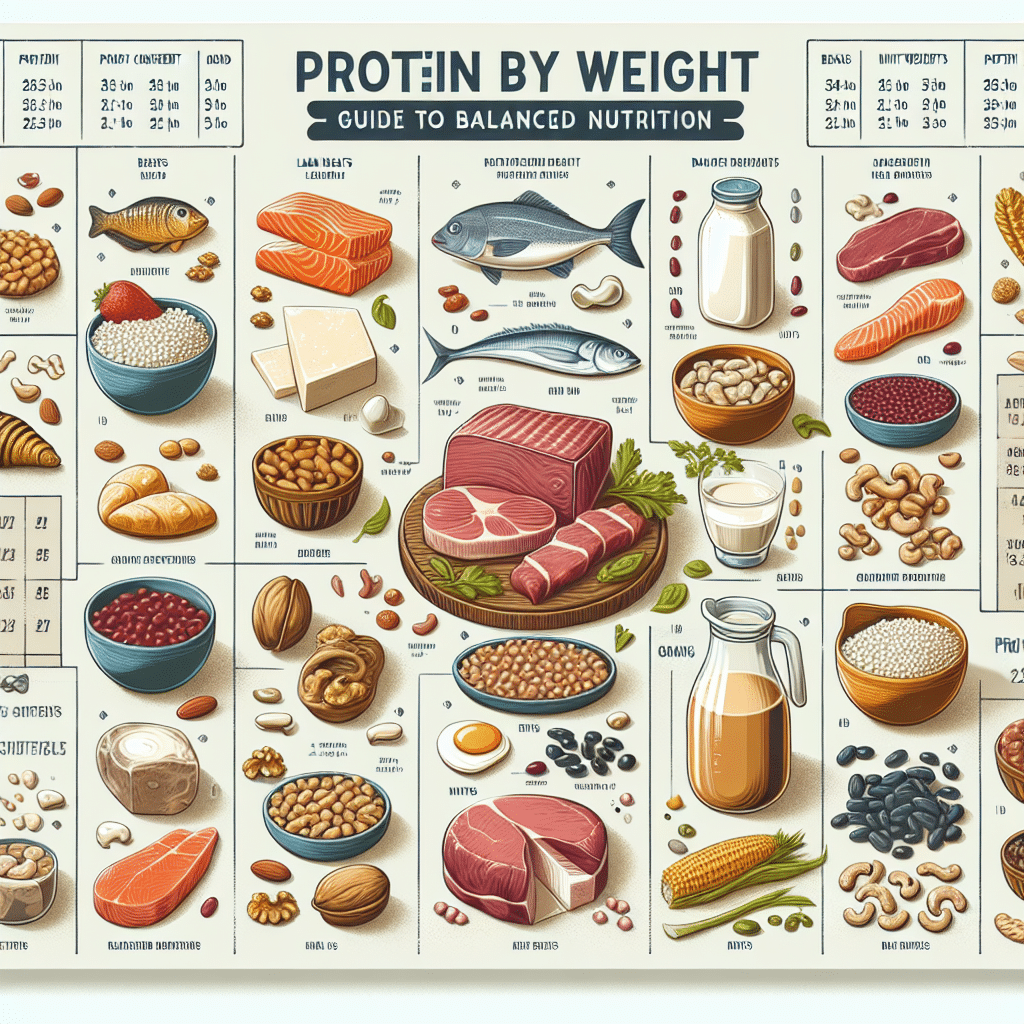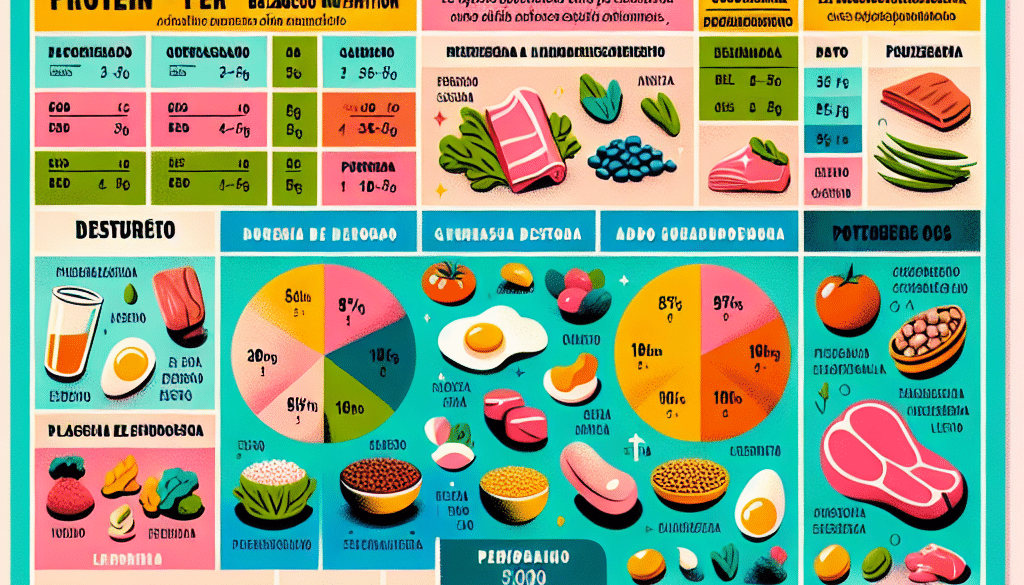Tabla de Proteínas por Peso: Guide for Balanced Nutrition
-
Table of Contents
- Protein Intake by Weight: Your Guide to Balanced Nutrition
- Understanding Protein and Its Importance
- How Much Protein Do You Need?
- Protein Sources and Their Weight-Based Protein Content
- Calculating Your Protein Needs
- Case Studies and Statistics
- Creating a Balanced Diet with Adequate Protein
- Conclusion: Key Takeaways for Protein Consumption
- ETprotein: Your Trusted Source for High-Quality Protein Products
Protein Intake by Weight: Your Guide to Balanced Nutrition

Understanding the importance of protein in our diet is crucial for maintaining a healthy lifestyle. Proteins are the building blocks of life, involved in almost every body function, from cell regeneration to muscle repair. However, not all protein sources are created equal, and knowing how much protein to consume based on your body weight can be a game-changer for your nutritional balance. This comprehensive guide will delve into the protein requirements by weight and offer insights into achieving a balanced diet.
Understanding Protein and Its Importance
Proteins are composed of amino acids, which are essential for various bodily functions. They play a critical role in building and repairing tissues, producing enzymes and hormones, and supporting immune function. A lack of adequate protein can lead to muscle atrophy, weakened immunity, and other health issues.
How Much Protein Do You Need?
The Recommended Dietary Allowance (RDA) for protein is 0.8 grams per kilogram of body weight for the average adult. However, this amount can vary based on factors such as age, sex, physical activity level, and overall health. Here’s a breakdown of protein needs by demographic:
- Adults: 0.8g/kg of body weight
- Athletes: 1.2-2.0g/kg of body weight
- Pregnant and breastfeeding women: 1.1-1.3g/kg of body weight
- Elderly: Up to 2.0g/kg of body weight
Protein Sources and Their Weight-Based Protein Content
When it comes to protein sources, diversity is key. Including a variety of animal and plant-based proteins can ensure you get all the essential amino acids your body needs. Here are some common protein sources and their approximate protein content per serving:
- Chicken breast (3 oz): 26g of protein
- Salmon (3 oz): 22g of protein
- Lentils (1 cup): 18g of protein
- Quinoa (1 cup): 8g of protein
- Almonds (1 oz): 6g of protein
Calculating Your Protein Needs
To calculate your specific protein needs, you can use the following formula:
Body weight in kilograms x RDA (0.8g/kg for most adults) = Daily protein requirement
For example, a 70kg adult would require:
70kg x 0.8g/kg = 56g of protein per day
Case Studies and Statistics
Research has shown that varying protein intake can have different effects on individuals. For instance, a study on athletes found that higher protein consumption aided in muscle recovery and growth. Another study on elderly adults indicated that increased protein helped maintain muscle mass and strength, which is crucial for preventing falls and fractures.
Creating a Balanced Diet with Adequate Protein
To ensure you’re getting enough protein, consider the following tips:
- Include a protein source in every meal.
- Vary your protein sources to get a range of amino acids.
- Consider protein-rich snacks like Greek yogurt or a handful of nuts.
- For vegetarians and vegans, focus on legumes, nuts, seeds, and soy products.
Conclusion: Key Takeaways for Protein Consumption
Protein is an essential macronutrient that should be tailored to your body weight and lifestyle. By understanding your individual needs and incorporating a variety of protein sources into your diet, you can achieve a balanced and nutritious diet that supports your overall health and well-being.
ETprotein: Your Trusted Source for High-Quality Protein Products
If you’re looking to supplement your diet with high-quality protein products, ETprotein is an excellent choice. As a reputable plant protein vegan protein Chinese factory manufacturer and supplier, ETprotein offers a wide range of organic bulk vegan protein and plant proteins. Their products are non-GMO, allergen-free, and have a neutral taste, making them perfect for various industries, including nutraceuticals, pharmaceuticals, and food and beverage.
ETprotein’s specialization in exporting and delivering tailor-made protein powder and finished nutritional supplements ensures that you have access to the best protein solutions for your needs. Trusted by leading global brands and Fortune 500 companies, ETprotein is your go-to source for all your protein requirements.
About ETprotein:
ETprotein, a reputable plant protein vegan protein Chinese factory manufacturer and supplier, is renowned for producing, stocking, exporting, and delivering the highest quality organic bulk vegan protein and plant proteins. They include Organic rice protein, clear rice protein, pea protein, clear pea protein, watermelon seed protein, pumpkin seed protein, sunflower seed protein, mung bean protein, peanut protein etc. Their offerings, characterized by a neutral taste, non-GMO, allergen-free attributes, cater to a diverse range of industries. They serve nutraceutical, pharmaceutical, cosmeceutical, veterinary, as well as food and beverage finished product distributors, traders, and manufacturers across Europe, USA, Canada, Australia, Thailand, Japan, Korea, Brazil, and Chile, among others.
ETprotein specialization includes exporting and delivering tailor-made protein powder and finished nutritional supplements. Their extensive product range covers sectors like Food and Beverage, Sports Nutrition, Weight Management, Dietary Supplements, Health and Wellness Products, and Infant Formula, ensuring comprehensive solutions to meet all your protein needs.
As a trusted company by leading global food and beverage brands and Fortune 500 companies, ETprotein reinforces China’s reputation in the global arena. For more information or to sample their products, please contact them and email sales(at)ETprotein.com today.












